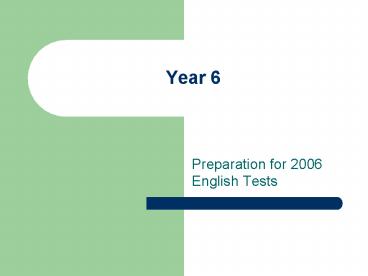Year 6 - PowerPoint PPT Presentation
1 / 16
Title:
Year 6
Description:
To explore practical approaches to support the teaching ... Writers are like magpies because they steal story ideas from all over the place' Pie Corbett ... – PowerPoint PPT presentation
Number of Views:126
Avg rating:3.0/5.0
Title: Year 6
1
Year 6
- Preparation for 2006 English Tests
2
Objectives
- To explore practical approaches to support the
teaching sequence for writing - To support daily teaching and preparation for the
2006 tests
3
Year 6 Term 2 - Narrative 2
- T9 to increase familiarity with significant
poets and writers of the past - Possible Texts
- The Listeners
- The Highwayman
- Harry Potter (DVD)
- The Hand
- The Cemetery Path
- Boo!
- The Oxford Book of Nasty Endings
- Write Your Own Thrillers
- Write Your Own Chillers p6/7
4
T9 to increase familiarity with significant
poets and writers of the past
- Readreadand read some more!
- Readers need to think about
- How the best stories are structured
- Which incidents sound exciting
- How the writer keeps the pace going
- How the paragraphs and sentences are written
- Reading like a writer!
5
Practical strategies
- Understanding Reading Comprehension 1,2 and 3
(DfES 1310 2005, 1311-2005, 1312-2005) - Speaking, Listening and Learning in KS1 and 2
- These materials will support you in the
effective teaching of reading through practical
strategies
6
T8 to analyse the success of texts and writers in
evoking particular responses in the reader e.g.
where the suspense is built
- Model the asking and answering of a range of
questions - Display the question throughout the sequence
- Discuss what is being asked
- Invite contributions from children, evaluate and
define - Underline key words and identify key phrases
- Develop understanding through discussion rather
than writing - Dissect the question and find evidence
- Practise little and
often!
7
T8 to analyse the success of texts and writers in
evoking particular responses in the reader e.g.
where the suspense is built
- Writers are like magpies because they steal
story ideas from all over the place Pie Corbett - e.g.
- Text marking and text analysis activities
underlining, highlighting, numbering parts
of the text e.g. Write your own Chillers p31-34 - Collect examples for writing journals, model in
shared and guided writing and encourage use
during independent writing
8
T2 To analyse how individual paragraphs are
structured in writing
- Write your own Chillers
- First paragraphs attention grabbers
- Second paragraph pulse racers
- Further paragraphs nail-biters (p.43-47)
- Paragraph checklist (p.59)
9
S3 To revise work on complex sentences
- Look at Stylish Sentences on p.36-37
- How could you use this to revise and consolidate
sentence structure? - How could this be used to illustrate how
sentences can be used for effect? - (see suggested games and activities handout AQA)
10
Focus on Spelling (see handout)
- By year 6 term 2 children should be revising
and consolidating word level through - Revisiting spelling conventions
- Developing a full range of spelling strategies
- Plan short and regular word level sessions with
built in meaningful assessment opportunities
11
T10 to use different genres as models to write,
e.g. short extracts, sequels, additional
episodes, alternative endings, using appropriate
conventions, language
- Look at the range of texts in your pack and
identify which would be a good model for writing - short extracts
- sequels
- additional episodes
- alternative endings
12
T12 to study in depth one genre and produce an
extended piece of similar writing, re-draft this
and bring to a presentational standard
- Writers at Work
- Five servants Who? Where? When? What? How?
- Get under the characters skin
- Set the scene
- Plan the plot
- Pull the trigger
- Shaping up (p.10 -22)
13
T12 to study in depth one genre and produce an
extended piece of similar writing, re-draft this
and bring to a presentational standard
- Polishing your Tale! Writing as a
Reader - Writers need to consider two things
(p.55-61) - Can the writing be improved?
- Is the writing accurate?
- Remember Every Sentence Counts
14
Non fiction text types
- It is important that pupils know the structure
and language features of the six text types. - They also need to recognise that some text types
may be a mixture of two or more genres. - They need opportunities to apply this in their
writing e.g. persuasive writing/playscript
15
Non fiction text types using the narrative unit
as a starting point
- Writers are thieves (balanced argument)
- How to write a suspense story (explanation)
- Recipe for a suspense story (instructions)
- CHILDREN ENCOURAGED TO STEAL AT LOCAL PRIMARY
SCHOOL (headline for newspaper) - Adapt part of the suspense story into film script
- Write persuasive letter to film company for
financial backing to make film - What other tasks could you plan for?
16
Next steps
- Plan how you will use these resources to
- Support effective learning and teaching of
English - Ensure that children are fully prepared in a
supportive and inspiring environment































